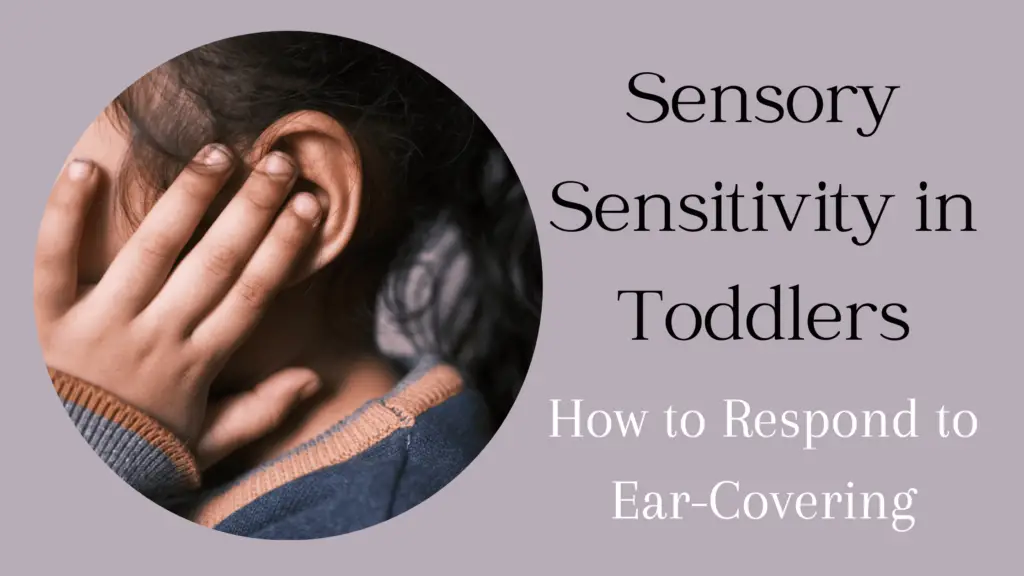As parents, we often find ourselves puzzled by the behaviors exhibited by our toddlers. One such behavior that commonly leaves us perplexed is when our little ones cover their ears. This is something that make many ask: why does my toddler cover his ears? Drawing from personal experiences and expert insights, we will explore the sensory world of toddlers, the common triggers for ear-covering, and when it might be necessary to seek professional help.
The Toddler’s Sensory World
Toddlers inhabit a unique developmental stage marked by rapid growth and exploration. During this phase, their sensory systems undergo continuous development as they acquire the ability to process a wide array of sensory information, encompassing touch, taste, smell, sight, and sound. Nevertheless, this developmental period can occasionally result in sensory overwhelm.
Sensory overload transpires when a toddler encounters an excessive volume of sensory stimuli, such as loud noises, intense lights, or crowded surroundings. Their evolving brains may grapple with the challenge of processing this inundation of information, which can trigger sensations of discomfort or even distress. In an instinctual effort to regain a sense of control and comfort, toddlers may resort to covering their ears as a means of attenuating some of the sensory input.
Exploring the Senses
Auditory Sensitivity
One of the primary sensory areas that toddlers are refining during this stage is their sense of hearing. Some toddlers may exhibit a heightened sensitivity to sound, making them more susceptible to discomfort or distress in noisy environments. This heightened sensitivity can be a contributing factor to ear-covering behavior.
Toddlers at this age are still learning to differentiate between various sounds and may find loud noises particularly overwhelming. In situations where noise levels exceed their comfort threshold, they may resort to covering their ears as a means of self-preservation. It’s important for parents to recognize that this behavior is a response to their sensory experiences, rather than an attempt to defy authority.
Tactile Sensations
Toddlers are also in the process of exploring their sense of touch, and they often use their hands to investigate different textures and sensations. Covering their ears may be part of this tactile exploration, especially when they are trying to understand how their ears feel when they are touched or covered. This behavior could be a way for them to gain a better understanding of their own bodies and how they interact with the world around them.
Why Does My Toddler Cover His Ears: Common Reasons
Understanding why your toddler covers their ears is crucial for providing appropriate support and reassurance. The common reasons as to why does my toddler cover his ears is sensory overload, ear infection, sound sensitivity and fear or anxiety.
1. Sensory Overload
Sensory overload frequently triggers the instinctive response of ear-covering in toddlers. When toddlers find themselves inundated with overwhelming sensory input, such as in a noisy, crowded environment, they may naturally reach for their ears as a means of diminishing the sensory onslaught and restoring a sense of tranquility.
In bustling settings like shopping malls or raucous family gatherings, toddlers can swiftly become overstimulated. Their capacity to sift through and process sensory information is still in the developmental stages, and when it becomes overwhelmed, it can lead to feelings of anxiety and discomfort. Covering their ears serves as a coping mechanism, affording them a brief respite from the sensory deluge.
2. Ear Infection
While sensory sensitivity is a common cause of ear-covering, it’s essential not to overlook potential medical issues. One such issue is an ear infection, which can be painful and uncomfortable for toddlers. Ear infections can occur suddenly and without warning, and they may lead to your child covering their ears in an attempt to relieve the pain or discomfort.
In addition to ear-covering, you should be vigilant for other signs of an ear infection, such as fever, drainage from the ear, or difficulty hearing. If you observe any of these symptoms, it’s crucial to consult a healthcare professional promptly. Timely treatment can help alleviate the discomfort and prevent complications.
3. Sound Sensitivity
Sound sensitivity, often referred to as auditory hypersensitivity, is another important consideration. Some children are naturally more sensitive to sound than others. This heightened sensitivity can be attributed to various factors, including genetics, underlying medical conditions, or even autism spectrum disorder. Toddlers who are sound-sensitive may cover their ears to shield themselves from loud noises that they find uncomfortable or even painful.
Sound sensitivity can manifest in various ways. For some toddlers, it may be specific sounds or frequencies that trigger their discomfort, while for others, it may be a generalized aversion to loud environments. Understanding the extent of your child’s sound sensitivity can help you make appropriate accommodations to minimize their distress.

4. Fear or Anxiety
Toddlers are still learning to navigate the world around them, and this journey is filled with moments of fear and anxiety. They may cover their ears as a response to feeling scared or anxious. This behavior can be triggered by various factors, including:
New Situations
Entering unfamiliar environments or encountering new situations can be intimidating for toddlers. The unpredictability of the world around them can lead to feelings of insecurity and apprehension. In such cases, covering their ears can serve as a self-soothing mechanism, allowing them to retreat from the overwhelming stimulus.
Loud Noises
Sudden, loud noises can startle and frighten toddlers. Fireworks, thunderstorms, or even the noise of a vacuum cleaner can trigger their fear response. In these instances, covering their ears is an instinctive reaction to shield themselves from what they perceive as a threat.
Separation from Caregiver
Toddlers form strong attachments to their primary caregivers, and any separation from them, even temporarily, can trigger separation anxiety. This anxiety can manifest as a need for comfort and security, which may lead to ear-covering. The act of covering their ears can be a way for toddlers to seek solace and reassurance when they are away from their trusted caregiver.
Read About: How to Dress Your Toddler for Sleep
How to Respond to Toddler Ear-Covering
As a concerned parent, your response to your toddler’s ear-covering behavior plays a pivotal role in helping them navigate their emotions and sensations. Here are some strategies to consider:
1. Observation and Empathy
- Pay Attention to Triggers: Carefully observe the situations or stimuli that trigger your toddler’s ear-covering behavior. Understanding the specific triggers can help you anticipate and manage their discomfort more effectively. Keep a mental note of when and where these instances occur.
- Acknowledge Their Feelings: Communication is key. Whenever your toddler covers their ears, take the opportunity to engage with them gently. Let them know that you understand their discomfort and empathize with their feelings. Use simple language and empathetic gestures to reassure them that they are safe and that you are there for them.
2. Create a Calm Environment
- Noise Reduction: If your toddler is sensitive to loud noises, consider using noise-cancelling headphones when appropriate or creating a quieter space at home. This proactive approach can help reduce their exposure to overwhelming sounds and provide them with a more comfortable environment.
- Consistent Routines: Establishing consistent daily routines can provide a sense of security for your toddler. Predictable schedules can help minimize anxiety and make them feel more at ease in their daily activities. Consistency provides reassurance in an otherwise unpredictable world.
- Comfort Objects: Some toddlers have comfort objects like a favorite stuffed animal or blanket. These items can provide a sense of security and familiarity, helping to soothe anxiety and reduce the need for ear-covering.

3. Encourage Communication
- Teaching Words for Feelings: Help your toddler build their emotional vocabulary by teaching them words for different feelings. For example, you can use simple words like “happy,” “sad,” “scared,” and “angry” to describe emotions. This can empower them to express their emotions verbally instead of resorting to ear-covering as a means of communication.
- Sign Language and Gestures: Consider using simple sign language or gestures to facilitate communication with your toddler, especially if they have limited verbal skills. Teaching them basic signs for common needs and feelings can provide them with alternative ways to express themselves and make their needs known.
By implementing these strategies, you can create a supportive and comforting environment for your toddler, helping them better cope with their sensory experiences and emotions.
Read About: Will My Toddler Remember Me Shouting
When to Seek Professional Help
While toddler ear-covering is often a normal part of development, there are instances where it may be necessary to consult a healthcare professional or child psychologist. Some red flags to watch out for include:
Persistent Behavior
If your toddler’s ear-covering behavior persists for an extended period and doesn’t seem to improve with your supportive efforts, it’s advisable to seek professional guidance. Persistent behavior might indicate underlying sensory processing issues or emotional challenges that require specialized intervention.
It’s essential to keep a record of the duration and frequency of the behavior. Discuss your observations with a healthcare provider, as they can provide valuable insights and recommendations to address any potential underlying issues.
Extreme Sensitivity
If your toddler displays extreme sensitivity to sensory stimuli, including sound, light, touch, or taste, it’s essential to consult with a healthcare provider or pediatrician. Extreme sensitivity can be indicative of sensory processing disorder (SPD) or other developmental concerns that need professional evaluation.
Pediatricians and child psychologists can perform assessments to determine the extent of your child’s sensory sensitivities and provide guidance on how to manage them effectively. Early intervention is crucial in helping children with SPD develop coping mechanisms and lead more comfortable lives.
Regression in Developmental Milestones
Should you notice a regression in your toddler’s developmental milestones, such as a sudden loss of language skills or a decline in social interaction, in conjunction with ear-covering behavior, it’s critical to seek immediate professional help. These signs may suggest conditions like autism spectrum disorder (ASD), which benefit from early intervention and specialized therapies.
Early diagnosis and intervention can significantly improve the long-term outcomes for children with developmental disorders. Healthcare providers and child psychologists can conduct assessments to determine if your child requires additional support or therapy.
Conclusion
Understanding why your toddler covers their ears is a crucial step in providing them with the support and care they need during their early developmental years. By recognizing the various reasons behind this behavior, from sensory overload to sound sensitivity and fear, you can respond empathetically and effectively.







